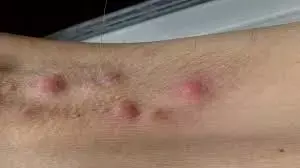- Home
- Medical news & Guidelines
- Anesthesiology
- Cardiology and CTVS
- Critical Care
- Dentistry
- Dermatology
- Diabetes and Endocrinology
- ENT
- Gastroenterology
- Medicine
- Nephrology
- Neurology
- Obstretics-Gynaecology
- Oncology
- Ophthalmology
- Orthopaedics
- Pediatrics-Neonatology
- Psychiatry
- Pulmonology
- Radiology
- Surgery
- Urology
- Laboratory Medicine
- Diet
- Nursing
- Paramedical
- Physiotherapy
- Health news
- Fact Check
- Bone Health Fact Check
- Brain Health Fact Check
- Cancer Related Fact Check
- Child Care Fact Check
- Dental and oral health fact check
- Diabetes and metabolic health fact check
- Diet and Nutrition Fact Check
- Eye and ENT Care Fact Check
- Fitness fact check
- Gut health fact check
- Heart health fact check
- Kidney health fact check
- Medical education fact check
- Men's health fact check
- Respiratory fact check
- Skin and hair care fact check
- Vaccine and Immunization fact check
- Women's health fact check
- AYUSH
- State News
- Andaman and Nicobar Islands
- Andhra Pradesh
- Arunachal Pradesh
- Assam
- Bihar
- Chandigarh
- Chattisgarh
- Dadra and Nagar Haveli
- Daman and Diu
- Delhi
- Goa
- Gujarat
- Haryana
- Himachal Pradesh
- Jammu & Kashmir
- Jharkhand
- Karnataka
- Kerala
- Ladakh
- Lakshadweep
- Madhya Pradesh
- Maharashtra
- Manipur
- Meghalaya
- Mizoram
- Nagaland
- Odisha
- Puducherry
- Punjab
- Rajasthan
- Sikkim
- Tamil Nadu
- Telangana
- Tripura
- Uttar Pradesh
- Uttrakhand
- West Bengal
- Medical Education
- Industry
Wide local excision of Hidradenitis Suppurativa lesions improves QoL and pain: Study

Wide local excision (WLE) of Hidradenitis Suppurativa (HS) lesions could be considered as a frontline treatment, according to a recent study published in Dermatologic Surgery.
Hidradenitis suppurativa (HS) is a chronic inflammatory skin disease that affects patients' quality of life (QoL). The skin lesions develop as a result of inflammation and infection of sweat glands.This condition features pea- to marble-sized lumps under the skin that can be painful and tend to enlarge and drain pus.
A group of researchers from Germany conducted a study to investigate changes in quality of life (QoL) in patients with Hidradenitis suppurativa (HS) after wide local excision (WLE) and to examine the level of pain, rate of postoperative complications, recurrences, and the time to complete wound closure.
Fifty-five patients were enrolled in this prospective study. All patients underwent wide local excision (WLE) of Hidradenitis suppurativa (HS), followed by secondary wound healing. Dermatologic Life Quality Questionnaire, pain and wound size were measured 1 day, 3 weeks, 3 months, and 6 months after surgery.
The results of the study are as follows:
- Dermatologic Life Quality Questionnaire and pain scores improved significantly from 14.5 ± 7.3 and 3.7 ± 2.8 at baseline to 5.8 ± 6.9 and 0.8 ± 1.7, 6 months postoperatively, respectively.
- Wounds were closed completely by secondary intention after 4.4 ± 2.8 months. Sixteen patients (29.1%) experienced postoperative complications, local recurrences in the treated sites were observed in 11 patients (20%), and new lesions in untreated sites were observed in 5 cases (9.1%).
Thus, the researchers concluded that Wide local excision (WLE) significantly improves patients' quality of life (QoL) and pain, and, given its low rate of recurrence and complications, should be considered as first-line therapy, especially in patients with higher Hurley stages.
Reference:
Improvement in Quality of Life and Pain in Patients With Hidradenitis Suppurativa After Wide Local Excision: A Prospective Study by Dick, Julika et al. published in the Dermatologic surgery.
doi: 10.1097/DSS.0000000000003235
Dr. Shravani Dali has completed her BDS from Pravara institute of medical sciences, loni. Following which she extensively worked in the healthcare sector for 2+ years. She has been actively involved in writing blogs in field of health and wellness. Currently she is pursuing her Masters of public health-health administration from Tata institute of social sciences. She can be contacted at editorial@medicaldialogues.in.
Dr Kamal Kant Kohli-MBBS, DTCD- a chest specialist with more than 30 years of practice and a flair for writing clinical articles, Dr Kamal Kant Kohli joined Medical Dialogues as a Chief Editor of Medical News. Besides writing articles, as an editor, he proofreads and verifies all the medical content published on Medical Dialogues including those coming from journals, studies,medical conferences,guidelines etc. Email: drkohli@medicaldialogues.in. Contact no. 011-43720751


